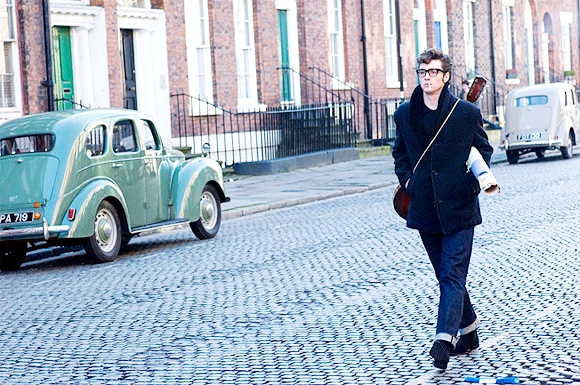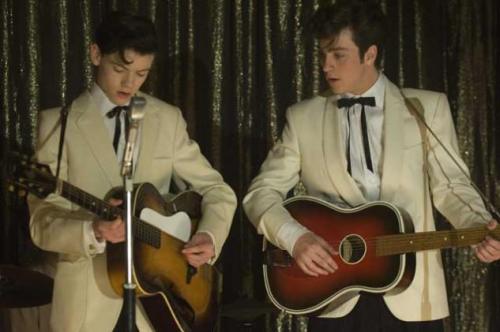
Review: Nowhere Boy and More at the Aspen Film Festival
Aspen Filmfest opened the last week of September, just before what would have been John Lennons 70th birthday. With blue skies and yellow leaves outside, the headliner on the big screen was Nowhere Boy, video artist and director Sam Taylor-Woods debut feature bio-pic about John Lennons teen years in Liverpool – named for Lennons band that preceded the Beatles.

Sangster and Johnson as McCartney and Lennon in Nowhere Boy
The movie opened October 8th nationally. And to commemorate Lennons 70th, the Quarrymen had been playing a two-month tour, taking their 1950s skiffle and rockn roll repertoire on guitar and banjo and drums, around the U.S. and the U.K., with a friend playing bass, and audience members coming onstage to strum washboard and beat kettledrum.
The movie – despite the subject matter – is surprisingly conventional. (Maybe as if to underscore that the 1950s,when the Quarrymen were together, did not have the synergy of the Beatles media moment in 1964, when they first appeared to U.S. audiences in back-to-back appearances on the Ed Sullivan show – and became an international sensation.)
The movie soundtrack lacks Lennons genius, or, except at moments, the Quarrymens sly sense of humor. But four British Academy Film award nominations including two for actors Kristin Scott Thomas (Aunt Mimi) and Anne Marie Duff (Lennons mum) reflect their strong performances, leaving the viewer with some sense of the polar forces pulling the young Lennon from aunt to mother, who had abandoned her son.
What does stand out in this film – which first screened in the U.S. at Sundance -is the alignment of stars and talent and luck that allowed Lennon and McCartney and Harrison to come together in Liverpool – and the instantaneous (as shown in the film) recognition of each others exceptional talents. Was it really that easy?
The Wheeler stage, after the screening, found the three Quarrymen, each dressed in black – Rod Davis and Len Garry and Colin Hanton – joining Filmfest artistic director Laura Thielen to talk and tell stories. Johns zanyness went missing from the film, one of the Quarrymen said, “but thats like focusing on the hole rather than the doughnut.”
They said Lennon had asked them to be in his band before any of them had played together. “He needed some place to put the name,” Hanton said from the stage.
Together in Liverpool they tried first skiffle, and later, after Lennon became mesmerized by Elvis, rock and roll. They played small town events with no amplification. Paul McCartney joined the band, then George Harrison.
But when Lennon, McCartney and Harrison went to Hamburg, the three Quarrymen stayed behind and “got on with our own dull lives.”
The set they played at the Wheeler showed stamina that was a tribute to their early rocker selves – and they outlasted most of the gray-haired audience. But it had a last reunion feel to it.
The next morning began with Summer Pasture, a documentary about nomadic lives in a remote corner of eastern Tibet that China overran. Filmmakers Lynn True and Nelson Walker, and the young Tibetan filmmaker Tserling Perlo, spent three months at 15,000 feet. There they recorded the daily life of two young Tibetan yak herders and their baby on Dzachukha, a sweep of high plains bounded by distant peaks.
The colors are rich inside and outside””the pale greens of the grass, the jolting pink of a plastic cartoon-figure alarm clock. Yama makes butter and cheese. Locho chases yaks. He checks his reflection in a small mirror and smears yak butter on his face. The dialogue is spare, the shooting intimate. As the summer passes, the camera stays with the rhythm of rising in the dark to the cartoon clocks alarm, milking the yaks by a single stars light, untethering the yaks, hunting down the yaks, feeding the fire, feeding the baby, making food, making fuel by hand.
When Locho goes to town to buy flour and sneakers, he cant read the billboards, or drive. Unable to speak Chinese, which has become the lingua franca as well as the language of commerce, or to read or write in any language, Lochos interactions with urban life are limited. In town “we are like yaks,” he says, that out of place, and then adds, “even yaks know where to go. ”
Aspen Filmfests eclectic selection – 19 films in 5 days – this year included six documentaries, five feature-length directorial debuts, and the balance independent films currently showing on the international festival circuit. Among them were Marwencol (Karlovy-Vary), The Kings Speech (Telluride and Toronto) and Uncle Boonmee Who Can Recall His Past Lives (Cannes, winner of the Palme dOr, 2010).
Missing was the Independent By Nature award, Aspens version of lifetime achievement award given some years to an outstanding actor or filmmaker. Past winners include Stanley Tucci, Julie Christie, Bob Rafelson, Anjelica Huston, and Harrison Ford.
What remained were the films, the onstage conversations– Thielen and director Derek Cianfrance, with his new film Blue Valentine, Thielen and director Mark Landsman with his new documentary Thunder Soul, and Thielen and former Aspen local Aron Ralston, the climber whose story of surviving being trapped alone in a remote Utah canyon for five days by a huge boulder that pinned his arm, and him, until he sawed the arm off with a dull knife, was made into 127 Hours, directed by Danny Boyle of Slumdog Millionaire. As the leaves fell, a week or so after the festival ended, Aspen Film announced its new executive director, Robyn Myler, an attorney and supporter of the arts in the Roaring Fork Valley.
